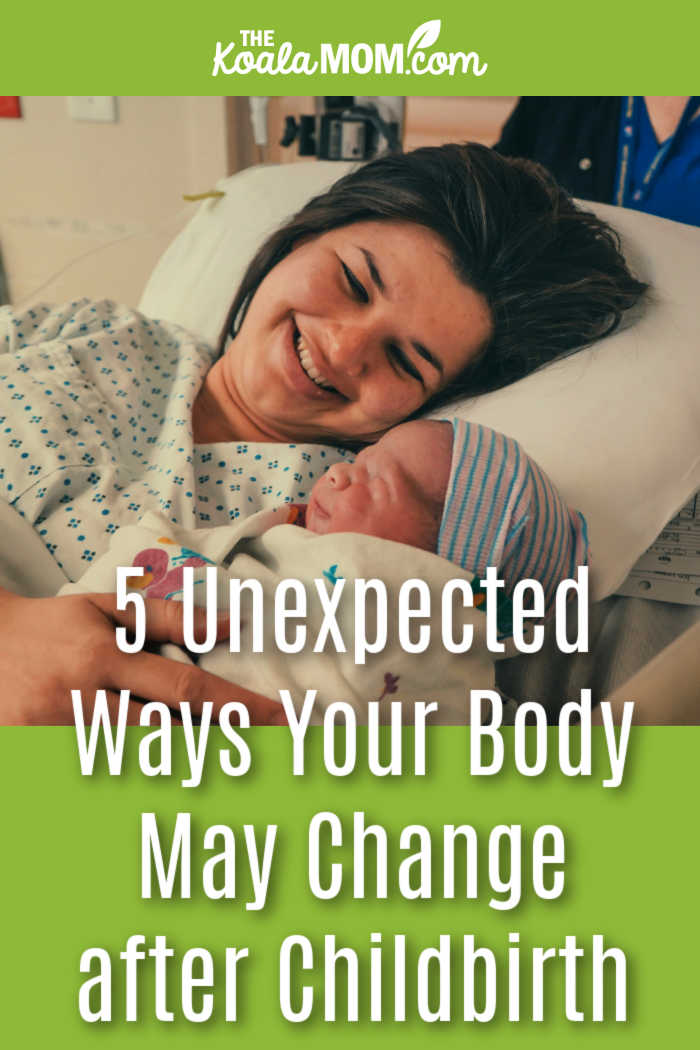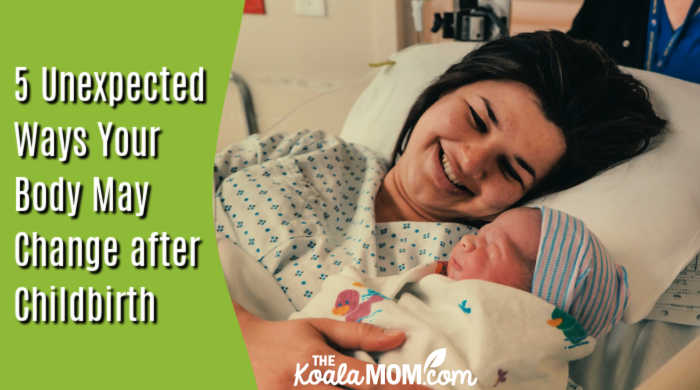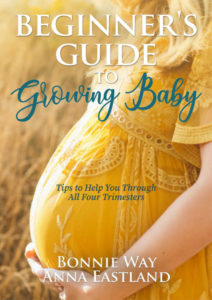Motherhood is not just about bliss and gratitude. While most women expect the world to become beautiful after having a baby, they are very surprised to discover that some parts of post-partum recovery are not as beautiful. According to March of Dimes, 1 in 8 new moms struggle with postpartum depression (PPD). This is a prolonged version of baby blues which last up to a month after childbirth. You may continue feeling depressed and depleted beyond this if you have PPD.
Besides the emotional turmoil, most women experience changes in physical appearance. Your body seems to sag, and you feel pounds of extra weight around your waist, on your hips, and on your face. These are the obvious marks your body bears after having a baby, but there are less evident ones too. Knowing about them beforehand will keep you from having unpleasant surprises.
In this article, we will explain the unexpected changes you may see in your body after childbirth.

Breast Changes
After childbirth, your breasts can change in several ways, and this will differ for each woman. Increasing or decreasing breast size is a common thing. For example, I found that my breast size increased greatly immediately after childbirth, and then, once I’d settled into a good rhythm of breastfeeding several months after birth, my breast size decreased again. WebMD lists the other changes you can expect beyond the post-pregnancy breast size.
You may see changes in the color of your areolas (the circles around your nipples) and prominent veins beneath your skin. Stretch marks and sagging may also happen for some women. In fact, some even witness their breasts becoming uneven. Consulting your doctor about these changes is a good idea, though most of them happen due to hormonal changes.
Some women’s breasts return to their pre-pregnancy appearance, but the majority will notice a lasting change. For example, my cup size after breastfeeding five babies for at least two years each is much smaller than it was before I got married. (That’s okay with me! I had a big bust back then and that’s not always comfortable.) Your breasts will likely settle into their new size after you wean your baby (unless you get pregnant again, and then the cycle begins again).
Hair Loss
Many new moms experience hair thinning or hair loss after pregnancy, known as telogen effluvium. According to Johns Hopkins Medicine, higher estrogen levels during pregnancy extend the hair’s growth cycle. Most women see their hair growing longer and thicker during this period. However, the days of your crowning glory may end as soon as your little one arrives.
As hormone levels return to normal after pregnancy, a lot of hair that was in the growing cycle will now enter the shedding phase all at once. Postpartum hair loss usually starts about three months after giving birth. It may end around 6–12 months after as your hormones settle. Good hair care can help you deal with the issue. Likewise, don’t stress about losing your lovely locks because it will only worsen the situation.
Urinary Incontinence
Postpartum urinary incontinence may come up as the nastiest after-effect of having a baby. According to a study published in the BMC Pregnancy and Childbirth, the incidence of this condition is surprisingly high at a whopping 26%. The factors that determine the risk include maternal age, weight, fetal weight, and type of delivery.
Many women experience difficulty controlling urination up to one year after giving birth. However, the condition may be more severe and lasting for some new moms. There are remedies like Kegel exercises and cognitive behavioral therapy.
Vaginal mesh implantation is a surgical recourse, but the recent vaginal mesh lawsuit has proved that it may not be the best option. TorHoerman Law notes that the vaginal mesh implant has harmed thousands of women, causing bleeding, organ damage, and infection. Most of the claims have been settled, and the settlement amounts till now have reached a hefty $8 billion. The situation clearly highlights the importance of seeking non-surgical options.
If you have ongoing concerns about urinary incontinence after your pregnancy, speak to your doctor about the best options for you (and how to prevent this problem in future pregnancies). A pelvic floor specialist may also be able to help you regain muscles down there that can help prevent this problem.
Shoe Surprise
If you think that pregnancy affects only your stomach, breasts, and hips, you are in for a big surprise. You may even go through a permanent change in the size and shape of your feet. Yes, you may have to buy a whole new collection of footwear before stepping out for work or having fun with your baby.
The reason for the change in your shoe size is as surprising as the change itself. The arch of the foot may flatten out due to pregnancy weight gain and the looseness of ligaments. The relaxation of the ligaments causes the bones to spread and widen, potentially requiring a larger shoe size. If you think that your pregnancy feet will lose the swelling after childbirth, wait for this shoe surprise!
Hyperpigmentation
The Guardian states that pigmentation during pregnancy is more common than you imagine, with 90% of women experiencing it. You may notice changes in the skin on your face and body. The spots can resemble freckles or flat patches of discoloration and may be dark brown, light brown, or blue/gray.
The condition is called hyperpigmentation or melasma, and it may resolve over time for some women. For others, these dark spots linger forever, staying as a mark of the journey to motherhood.
Hormonal fluctuations during and after pregnancy are the cause of pigmentation. You can consult a dermatologist to get prescription medications and ointments to deal with this condition. Remember that any product you use during pregnancy or breastfeeding should be safe.
Accept Your New Body
When I’ve commented on the ways my body is different after birthing and breastfeeding five children, my partner has reminded me that my body is beautiful. If my breasts are smaller and my tummy is a bit stretchier, it’s because I have five beautiful, amazing kids. My high school grad dress may no longer fit me the way it did when I was eighteen, but there are so many other ways that I am not the same girl I was back then. I’ve grown and changed, and the changes in my body are only a small part of that. I’m proud of who I am today, including what my body looks like.
I encourage you to also look at your body with pride and acceptance. Your entire body has worked hard to grow and birth this amazing baby you now hold. And while there have been many ups and downs along the journey, the entire journey is still amazing and miraculous. Celebrate what your body has accomplished. Don’t compare your healing to a friend’s healing. You may take longer to bounce back physically than a friend did, or maybe your body has recovered but your mental health is still a struggle. Give yourself time and grace and lean on your support systems.
FAQs
Why do I feel different after giving birth?
The birth of a baby can trigger emotional turmoil, and moms feel excitement, joy, fear, and anxiety at the same time. Most new moms experience postpartum “baby blues,” which include mood swings, anxiety, and insomnia. Physically, you may feel drained and restless, besides experiencing pain. Remember that many of these symptoms are temporary and give yourself grace as you recover. Take time to rest and respond to the changing needs of your body.
What are maternal postpartum danger signs?
Most new moms feel tired or uncomfortable after giving birth, and this is normal. You may also experience some postpartum bleeding (lochia). However, some symptoms could indicate dangerous complications. Watch out for warning signs like very heavy bleeding, a bad headache, or a fever.
What symptoms should you not ignore after giving birth?
While most women know about physical signs that signify danger after childbirth, some mental health symptoms are easy to ignore. Postpartum depression, though it does not seem dangerous, might have serious consequences. Likewise, insomnia is a reason to worry for new moms.

Childbirth is a daunting feat as it stretches your body and mind to their limits. The struggle does not end with bringing the baby into the world. New moms experience some obvious and less obvious changes in their bodies. Being prepared makes it easy to live with these changes and regain your strength and confidence.
 Love this post? You’ll find more tips and advice like it in Beginner’s Guide to Growing Baby: Tips to Help You Through All Four Trimesters, a book about pregnancy, birth, and baby’s first three months. Written with my good friend Anna Eastland (mom of 9 kids!), Beginner’s Guide to Growing Baby is an honest, practical look at pregnancy and beyond. We share what’s worked for us in growing, birthing and loving fourteen babies.
Love this post? You’ll find more tips and advice like it in Beginner’s Guide to Growing Baby: Tips to Help You Through All Four Trimesters, a book about pregnancy, birth, and baby’s first three months. Written with my good friend Anna Eastland (mom of 9 kids!), Beginner’s Guide to Growing Baby is an honest, practical look at pregnancy and beyond. We share what’s worked for us in growing, birthing and loving fourteen babies.
Beginner’s Guide to Growing Baby is available on Amazon.

No Responses Yet